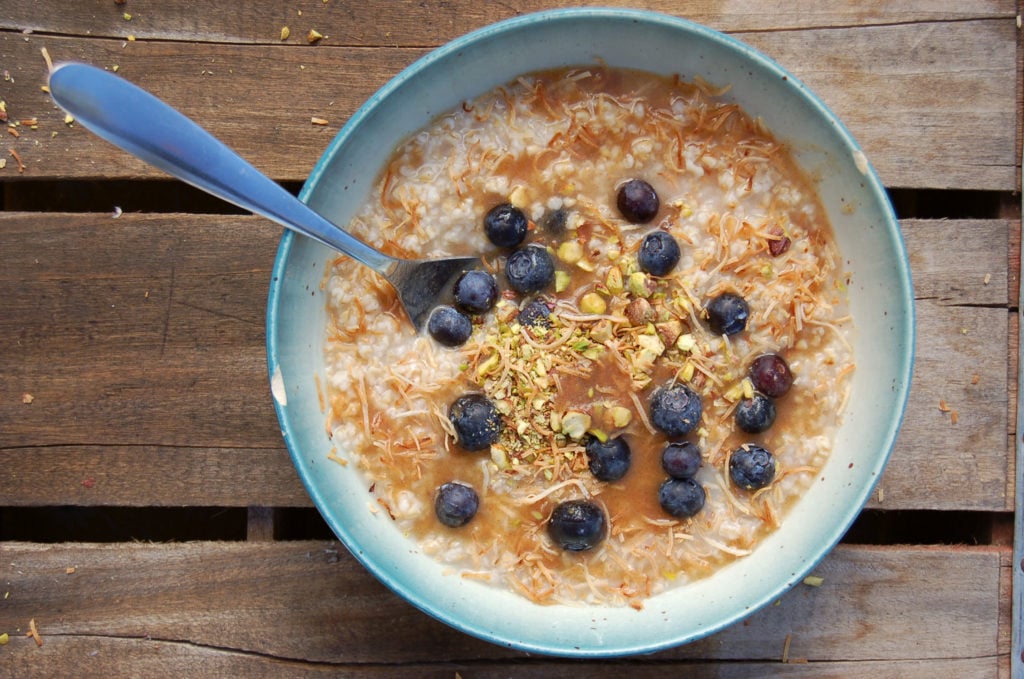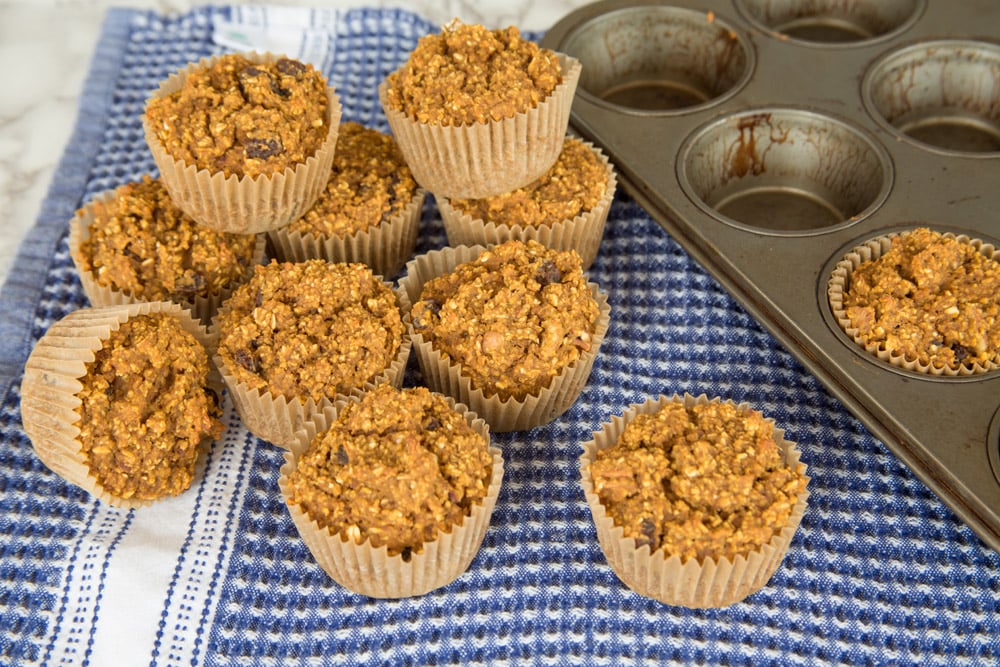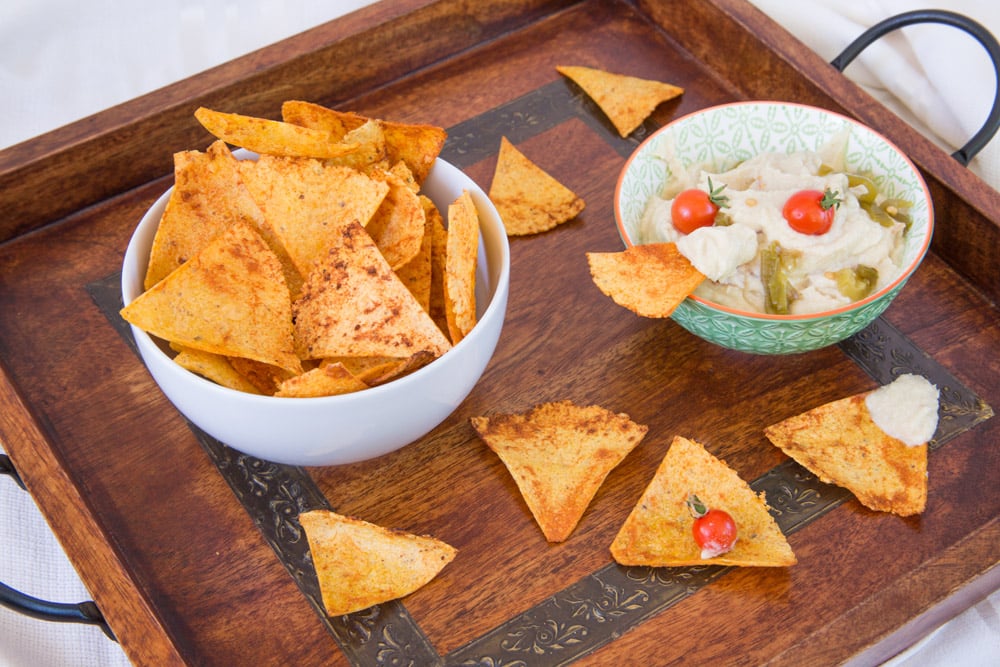By Molly Patrick
Mar 14, 2020,
By Molly Patrick
Mar 14, 2020,
A few months ago, I asked people from our community dealing with diabetes to reply back if their hemoglobin A1c, a measure of blood glucose concentrations over time, had decreased since following our whole-food plant-based Meal Plans.
Since then, I’ve chatted with Katie Holt and Dr. Elina Tomski about how following our meal plans has helped them reverse their pre-diabetic status. What I didn’t expect was to hear from someone who had success with managing type 1 diabetes by eating a Whole-Food Plant-Based diet and using our Plant Fueled Meal Plans to help them.
Tessa and Steve Decker are an awesome couple who have been in our community and following our Meal Plans for about two years. The Deckers have a long history of vegetarianism with a blip of omni eating while their children were younger.
In the past few years, Tessa, a registered nurse, decided her own cholesterol and blood pressure increase were enough motivation for her to start moving towards a vegan diet. Not long after, she found Clean Food Dirty Girl and started batching the plant based Meal Plans for the two of them.
Steve was diagnosed with type 1 diabetes at the age of 27 and every day he injects himself with insulin in amounts that are based on how his body responds to dietary carbohydrates (that are digested into glucose).
Managing insulin needs as a type 1 diabetic is something you must do to stay alive. The better you are at managing your insulin needs and understanding how your body responds to carbohydrates, the healthier you will be. And, lowering the amount of insulin you need while still consuming carbohydrates is a good thing because it means your body is using glucose efficiently.
Tessa & Steve were surprised when, despite eating lots of carbohydrates, the amount of daily insulin Steve needed to manage his blood glucose plummeted by 40%!
He did this by simply eating whole plant foods.
This interview is as informational as it is inspirational. Steve has been an avid cyclist throughout his adult life. He talks about the challenge of learning to manage his insulin requirements and exercise regimen to avoid hypoglycemia, a potentially life-threatening situation in which there is not enough glucose circulating in the blood to maintain normal body function.
He talks about other steps he’s taken to further reduce his insulin, and Tessa shares her tricks for modifying the fat content of our plant based Meal Plan recipes that have helped Steve fine-tune his insulin needs.

As a follow-up, Steve let us know that his A1C used to hover around 7.8 – 8.0. Once Tessa and Steve transitioned to eating whole-food plant-based, Steve’s A1C dropped down to 6.4 and his most recent A1C was 5.8.
If you haven’t watched the video, please do! You’ll see that Steve is motivated to track his body’s response to foods and his transition to eating all plants has helped him be super tuned in to his needs.
Thank you, Tessa and Steve, for taking time to chat with me, and your willingness to share your story!
Steve touches on this in the interview and we must highlight it here:
It’s important to know that changing your diet can cause medication needs to change very quickly, particularly if you take insulin. We can’t stress enough that if you take medication and you are inspired to eat more whole plant foods, be sure to consult with your doctor so they can safely guide you through medication changes.
Whole food plant-based diets are not currently offered as a dietary strategy in diabetes treatment care. Both Tessa and Steve talk about this and how his story has sparked the interest of medical professionals.
We hope that sharing their story contributes to increased momentum for formal research into the impact of the whole-food plant-based dietary pattern on managing type 1 diabetes.
The more research done, the better the medical community can help guide their patients who are motivated to make dietary changes.
Are you living with type 1 diabetes and have been able to reduce your insulin needs by eating a whole-food plant-based diet? We’d love to hear from you in the comments below!

Ingredients
Instant Pot Ingredients
- ½ cup unsweetened, non-dairy milk (120 ml)
- ⅓ cup frozen corn kernels (45 g)
- 4 teaspoons nutritional yeast
- 1 teaspoon salt
- ½ teaspoon garlic powder
- ¼ teaspoon black pepper (about 10 turns)
- 6 cups cauliflower florets (600 g)
- 2 ½ cups diced red skin potatoes (1-inch dice / no need to peel / 500 g)
- 1 cup water (235 ml)
Stove Top Ingredients
- ¾ cup unsweetened, non-dairy milk (175 ml)
- ⅓ cup frozen corn kernels (45 g)
- 4 teaspoons nutritional yeast
- 1 teaspoon salt
- ½ teaspoon garlic powder
- ¼ teaspoon black pepper (about 10 turns)
- 2 ½ cup diced red skin potatoes (1-inch dice / no need to peel / 500 g)
- 6 cups water (1.4 L)
- 6 cups cauliflower florets (600 g)
Instructions
Instant Pot Directions
- Place the non-dairy milk, corn, nutritional yeast, salt, garlic powder, and black pepper in your blender. Stir with a spoon and set aside for now.
- Place the cauliflower florets, diced potato, and water in the inner pot of your Instant Pot (IP) and lock the lid into place, making sure the nozzle is pointed in the sealing position. Set the timer for 3 minutes on Manual (or Pressure Cooking) mode. When the timer goes off, use the natural release method for 5 minutes and then manually release the remaining pressure. Drain the veggies, discard any remaining liquid, then transfer to a large mixing bowl. Set aside for now.
- Blend the corn mixture that’s in your blender until it’s creamy and smooth. Transfer the blended mixture to a small saucepan and simmer for 5 minutes, over medium-low heat, stirring frequently so it doesn’t burn. Pour the mixture over the potatoes and cauliflower and mash with a potato masher or large fork until the veggies are well mashed and the corn mixture is thoroughly combined.
- Add salt and pepper to taste and store in the fridge when completely cooled.
Stove Top Directions
- Place the non-dairy milk, corn, nutritional yeast, salt, garlic powder, and black pepper in your blender. Stir with a spoon and set aside for now.
- Place the diced potato and water in a large stockpot. Bring to a boil over high heat and boil for 5 minutes, uncovered. Add the cauliflower florets, reduce the heat, and simmer for an additional 15 minutes, until soft. Drain the veggies (discard the water) and transfer to a large mixing bowl. Set aside for now.
- Blend the corn mixture that’s in your blender until it’s creamy and smooth. Transfer the blended mixture to a small saucepan and simmer, uncovered, for 5 minutes, over medium-low heat, stirring frequently so it doesn’t burn. Pour the hot mixture over the potatoes and cauliflower and mash with a potato masher or large fork until the veggies are well mashed and the corn mixture is thoroughly combined.
- Add salt and pepper to taste and store in the fridge when completely cooled.











Wishing you a happy week. May it be filled with shifting your paradigm.
Xo
Molly
8 Comments
Leave a Comment
You may also enjoy...

Stacia’s Transition from Vegetarian to Whole-Food Plant-Based (video chat) + Toasted Garlicky Pumpkin Seeds

Reversing Pre-Diabetes With A Plant Based Diet. Stephen Rocked It! + Steel Cut Oats With Date Syrup Recipe
Love the food that loves you back
Get instant access to thousands of plant-based recipes and meal plans, no credit card or perfection required.











Thank you Molly. For giving people space to be, to share their journeys and for encouraging calm and wellbeing. Supporting your own Immune system has not been mentioned much in mainstream headlines but it’s gathering force…. xx
Thank you for this interview and inspiration! My daughter is T1 and when we are consistent with a WFPB diet, her insulin needs definitely reduce. I try to gently promote it in the T1 mama community which is heavily pro low-carb. My hope is that as my girl gets older, she will choose WFPB for herself ? but for now, she’s 8 and it’s difficult to be all in.
I’m Type 1 and switched to a plant-based diet about a year ago. My insulin requirements dropped by about 20% and I was thrilled. Over the course of the next year, things like eggs, cheese, cream crept back in, and I didn’t understand why that was affecting my insulin needs. I do now, having bought and started reading Mastering Diabetes, which Steve and Tessa mention in your interview with them. Starting yesterday, I am back on the plant-based train! Thank you, Molly and team, for all that you do!!!!
Ann,
We are so glad Molly reached out to diabetics to hear and share their story. We are hoping conversations like this will move the ball forward for more research and education as to how a WFPB way of eating can manage diabetes and so many other chronic diseases. Mastering Diabetes is a phenomenal program. I’m sure you will see results quickly. Good luck in your journey!
Thank you Tessa,
You guys are an inspiration! I am so excited to eat fruit again, you have no idea!
Ann
Good to know that works too! I learn so much from you as well! Keep it up great post.
I’m also a type 1 diabetic since the age of 12. I don’t follow the meal plan I’m just not a meal prepped large batch cooking kind of girl but CFDG was a HUGE help when I started eating WFPB. It was kind of my go to and still is. My A1C was about the same around 8 and now after 2 years it stays at 6. It has literally changed my life. Not just the diabetes control but the energy and how my body feels now. I’m amazed all the time. So thank you for being a delicious resource and help.
Is this meant to be served cold? You didn’t give any indication about how to plate it, toppings, side dishes, etc…..just cool it. Thank you